#elul
Text
The Shofar Breaks Your Heart
by Dane Kuttler
When you give a girl a shofar –
no, not a proper instrument of G-d,
but a rough-cut horn with no real mouthpiece
her aunt brings back from a trip to Jerusalem,
don’t make it easy.
Put it up on the shelf in the living room
where its curled promise of a shout
will tempt her until she can reach it on tiptoe.
Tell her no one has ever found its voice,
that she will only make it grunt, bray and sputter
like the animal it came from.
Then give her a few years.
Give her an empty garage and a neighborhood
Jewish enough to understand what it’s hearing
so she can practice until
tiny tekiot burst forth from the scrap of ram.
She will be the only one who can ever shape its sounds,
can bend the call to tekiah, round off nine drops of t’ruah wailing,
fling the anguished cry of a sh’varim from its mouth.
Let her brag about this. Remember that children
are not humble creatures, that the simple act of being heard
is their great triumph. Let her be heard.
Bring her to Hebrew school.
Teach her the story of the rabbi
who told his students that he would put the words of Torah on their hearts;
that the words would only find their way in when the students’ hearts broke.
Let her sit with that tale for as long as it takes
for her own heart to shatter, for torah and poetry and forgiveness
find their way inside,
play her Leonard Cohen. Let him croon about the cracks in everything,
that’s how the light gets in, let her begin searching for light,
ask her where she thinks the cracks come from,
give her Auschwitz, give her Torquemada, give her pogrom and
quota and blacklist, the ashes of all her burnt bridges,
give her avinu malkenu, ashamnu, ashamnu, ashamnu,
watch her break
her heart
with her fist.
Give her the shofar.
Let the horn steal her breath,
let her begin to understand that she’s not holding a dead piece of animal,
but a living prayer.
Teach her: after every blast
you can hear the echo
of the still small voice.
If you listen for it,
you can hear the calls for the wild cries they are;
salute them with a straight back when they yank you from your amidah;
and should you hear a shofar blower struggle and gasp and strain for each call,
imagine yourself a trapped animal, desperate to be heard.
When it’s over,
Close your eyes.
Be. Broken. Here. Before G-d and your people. Be. Cracked.
feel the light
and the words
come
in.
#they read this at shul tonight and it was so powerful and i thought i'd share it#jumblr#judaism#poem#poetry#shofar#rosh hashanah#high holidays#elul#jewish art#dane kuttler#yom kippur
1K notes
·
View notes
Text
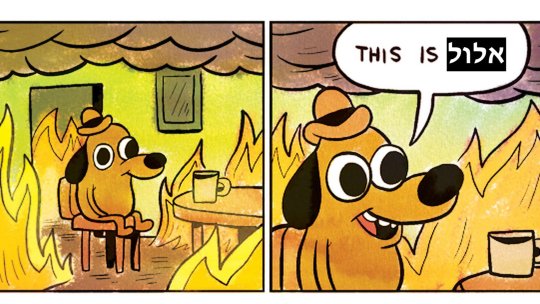
my friend made this back in 2020 but it still works today
775 notes
·
View notes
Text
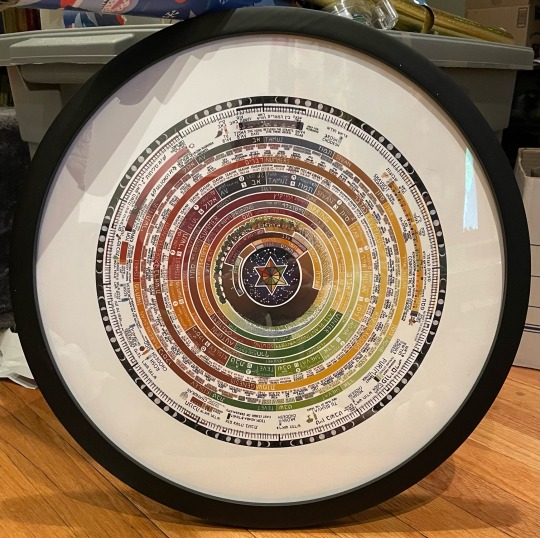
I found this MAGNIFICENT circular depiction of the Jewish calendar by Claymil on Redbubble (link is in their ig bio) and bought it immediately. I love that it’s sandwiched between celestial elements and includes the agricultural cycle.
I’m going to put 6 sawtooth hangers around the frame so the current season is always oriented up-ish. It would be even cooler if I could attach it to something that mounts to the wall and spins but I haven’t seen anything that fits the bill yet.
Edit: Also I cut it into a circle. It definitely did not come like that.
347 notes
·
View notes
Text
Hey fellow yidden: some motivation for you this Elul
So maybe this year you've done some backsliding on some mitzvot. So maybe you haven't davened as much as you would like. Maybe you missed opportunities to go to things in community because you just couldn't motivate yourself. Or perhaps there were things that you struggled to do individually.
Perhaps the reason that you missed opportunities for mitzvot is because you were afraid of missing out on something else.
Well, as a traditional egalitarian Jew who tries but has ADHD, depression, lots of executive dysfunction, a demanding job, relationships to maintain, and 900 hobbies, I feel you.
But fear not! I have two suggestions for ways to help you seek out mitzvot in every area of your life.
Suggestion the first: Weaponize the FOMO
At least for me, I'm always worried that if I daven as much as I would like to (as one example) I am going to miss out on [x] other thing. However, instead, sit yourself down and consider what one mitzvah you want to prioritize. Then, imagine never being able to do it again.
My friend, that day will come.
Mitzvot are for the living. A Jew being buried in their tallit has the tzitzit trimmed off first. Why? Because mitzvot are the project of the living and all we can know for sure about death is that it will come for all of us, eventually. If you believe in an afterlife, your deeds - good or bad - will accompany your soul on your way home. And you will be comforted and bask in the mitzvot you performed. And if you don't believe in an afterlife? Well, this is your one shot, and whatever deeds you leave behind is all that will be left of you someday.
Better wear those tzitzit now, then.
Suggestion the second:
Look for the kedusha in literally everything.
One of the truly amazing things about Judaism is that every moment, no matter how mundane, is full of opportunities to engage in mitzvot. Whether it's saying Asher Yatzar after using the restroom, washing your hands before meals, saying brachot before eating food, wearing certain clothing (tzniut, no shatnez, ritually significant like a kippah, etc.), being kind to animals (even insects), honoring your parents, visiting a sick or recovering friend, compromising with your spouse for shalom bayit, giving money to the poor, or simply reaching out to a friend who might be sad, lonely, and struggling - there are daily opportunities to connect and to infuse every moment of your life with holiness.
Judaism is so much about how we treat each other, our world, our bodies, and our communities, and these in turn are what help us to understand how to treat our souls and our relationship to the Divine. Judaism is about relationships. And the opportunities don't require you to go to shul, or don tefillin, wait for the high holidays, or give extravagantly. (Although those things are great if you want to do them, too!)
By design, the mitzvot are meant to allow you to connect with Judaism, with yourself, your world, and Hashem at every turn, simply by living your life. It's honestly a very old form of mindfulness, long before that was a buzzword.
So, weaponize that FOMO in one breath, knowing this is the only life we have, and in the next breath, really open your eyes to the opportunities that already surround you in every facet of your life. They are there if you look, and you will never miss out if you keep on looking.
148 notes
·
View notes
Text
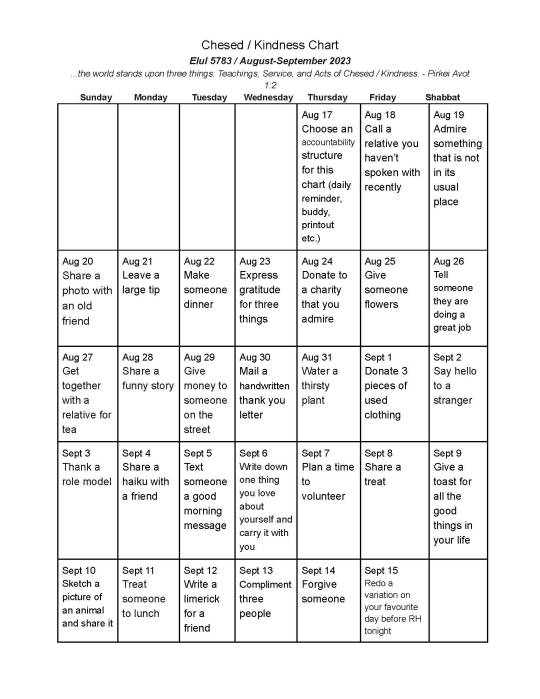
The Hebrew month of Elul begins tomorrow. It's a month that is meant to be focused on returning to the best parts of ourselves. If you find it helpful, here are some suggestions of daily acts of kindness (in Hebrew, chesed) for the month leading up to Rosh Hashana, the Jewish New Year.
92 notes
·
View notes
Text
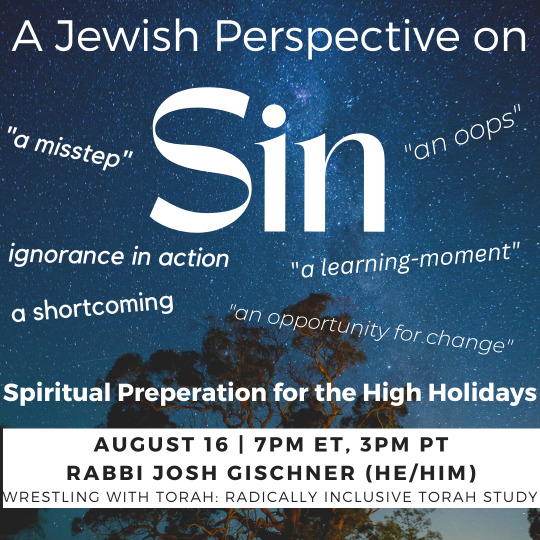
All are welcome! Jewish! Not Jewish! Kind of Jewish! Jewish-adjacent! All are welcome!
Financially Accessible Option Available via the Wrestling with Torah Discord.
Contribute and Register here!
In Jewish Tradition, the concept of 'sin' doesn't necessarily mean what you think it means: and it can be a transformational concept that helps us to become better versions of ourselves.
In Hebrew, the words often translated as "sin" does mean all of the negative things our culture associates with the word, but it also means so much more. Everything from a "misstep" or an "oops," to a spiritual moment to make amends and learn from this particular experience.
Come join Rabbi Gischner as we begin the spiritual process of reflecting on our year as we celebrate the first of Elul together, to reflect on who we have been and who we are becoming as we enter the new year of 5784 together.
#judaism#jumblr#jewish#progressive judaism#wrestling with torah#wrestlingwithtorah#rosh hashanah#wwt#torah#torah study#elul#hebrew#sin#chet#misstep#oops#mistake#theology#philosophy#self help#self growth#growth
119 notes
·
View notes
Text

JEWISH
What is Rosh Hashanah and how is it celebrated?
Rosh Hashanah, meaning "head of the year" in Hebrew, is the celebration of the Jewish New Year. It’s commemorated with prayers, food and gatherings.
By Danielle Abreu • Published 6 hours ago •Updated 5 hours ago
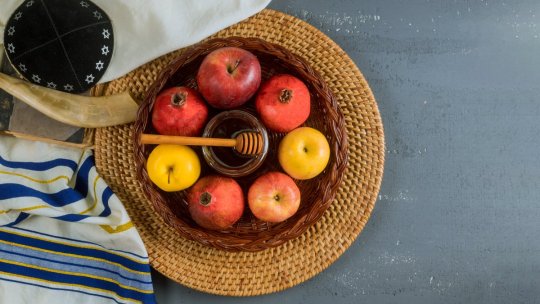
Rosh Hashanah is a two-day holiday celebrating the Jewish New Year and kicks off the start of the Jewish High Holiday season. Here’s everything you need to know about this important holiday celebrated by people around the world.
The two-day holiday known as Rosh Hashanah kicks off the beginning of the Jewish "High Holidays," a ten-day period of repentance and reflection that culminates with Yom Kippur, also known as the Day of Atonement, the holiest day of the Jewish calendar.
But what exactly is Rosh Hashanah and how is it celebrated? Here's everything you need to know:
What is Rosh Hashanah?
Rosh Hashanah, meaning "head of the year" in Hebrew, is the celebration of the Jewish New Year. During Rosh Hashanah, Jewish people around the world ask God for forgiveness for mistakes they’ve made over the past year and remind themselves not to repeat those mistakes in the coming year.
Get Tri-state area news and weather forecasts to your inbox. Sign up for NBC New York newsletters.
What is Yom Kippur?
Yom Kippur comes on the last of the 10 days of repentance that began with Rosh Hashanah. The day is usually observed with fasting and extended time in deep prayer, before ending with the sounding of a "shofar," a trumpet made from a ram's horn.
When is Rosh Hashanah and Yom Kippur 2023?
Rosh Hashanah is observed on the first day of the month of Tishrei on the Hebrew calendar, which falls in September or October on the Gregorian calendar, the calendar commonly used throughout the world.
This year in 2023, Rosh Hashanah begins at sunset on Friday, Sept. 15, and ends at sunset on Sunday, Sept. 17. Yom Kippur will begin next week on the evening of Sunday, Sept. 24, and ends the evening of Monday, Sept. 25.
How is Rosh Hashanah celebrated?
Rosh Hashanah observances include special foods, traditions and mitzvahs, or commandments, and celebrations can vary from family to family. Many people attend services at a temple or synagogue, where a special service is held with messages of hope and atonement in the new year.
A hollowed-out ram’s horn, called a shofar, is blown during services to awake any spiritual slumber and remind worshipers to return to God and reflect on their sins.
Another important part of Rosh Hashanah is Tzedakah, or giving back to those in need. The belief is that by carrying out good deeds, God will notice these efforts and bless them with a fruitful new year.
Some Jewish families toss bread crumbs into bodies of water to symbolize the discarding of their sins, a tradition that dates back centuries.
APR 15, 2022
What Is Passover Seder? The Meaning Behind 6 Jewish Food Traditions
MAY 16
Biden Welcomes Hosts Reception to Mark Jewish American Heritage Month
What Do People Eat During Rosh Hashanah?
Fish is a traditional meal at Rosh Hashanah as it symbolizes fertility and abundance. Some people will eat the head of the fish to express the desire to be leaders and not followers in the year.
Many Jewish families also eat challah bread and apples dipped in honey, symbolizing the sweet hopes for the New Year.
Some families will also eat pomegranate fruit as its many seeds represent the many blessings in the coming year.
What Are Rosh Hashanah Greetings?
Because Rosh Hashanah celebrates the Jewish New Year, the most common greeting is "Happy New Year." The equivalent in Hebrew is "Shanah tovah," (pronounced shah-NAH toe-VAH) which literally means "good year."
Shanah tovah is the condensed version of a longer greeting L’shana tovah u’metukah, which means “for a good and sweet year.”
You can also say "chag sameach" (pronounced KHAHG sah-MEY-akh) which means "happy festival," the Hebrew equivalent of Happy Holidays."
This article tagged under:
JEWISHROSH HASHANAHYOM KIPPUR
SHANA TOVA to my fellow Jewish people around the country and the world
#Rosh Hashanah#jewish#elul#jewish holidays#high holidays#yom kippur#what you need to know#jewblr#forgiveness#heal#trust#understanding#honesty#believe#forgiveness of sins#forgiveness quotes#apples and honey#Sweet new year
79 notes
·
View notes
Text
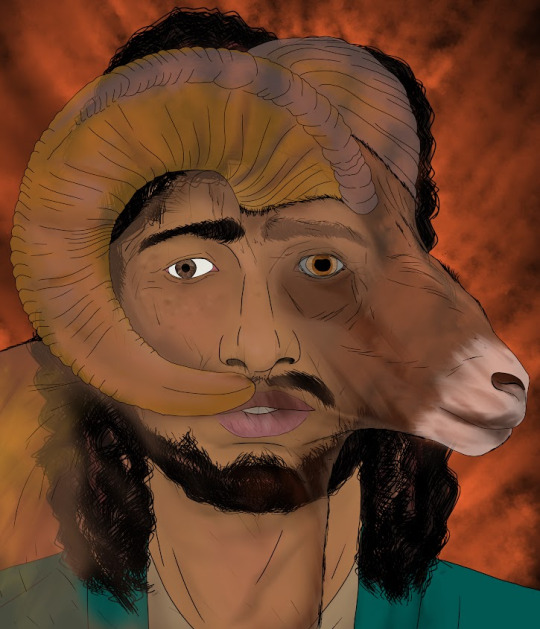
Yitzchak and the Ram: Fates Exchanged
During the month of Elul and on Rosh HaShanah, we blow the shofar, which is commonly in the form of a ram's horn. One of the reasons we do this is to remind Hashem of how Yitzchak was almost sacrificed, but an angel intervened and Yitzchak was exchanged with a ram, and to convince Hashem to intervene on our behalf and cancel any harmful decree against us for the upcoming year.
[id in alt text]
#jumblr#my art#jewish art#digital art#yitzchak avinu#akedat yitzchak#rosh hashanah#judaism#elul#shofar#the binding of isaac
69 notes
·
View notes
Text
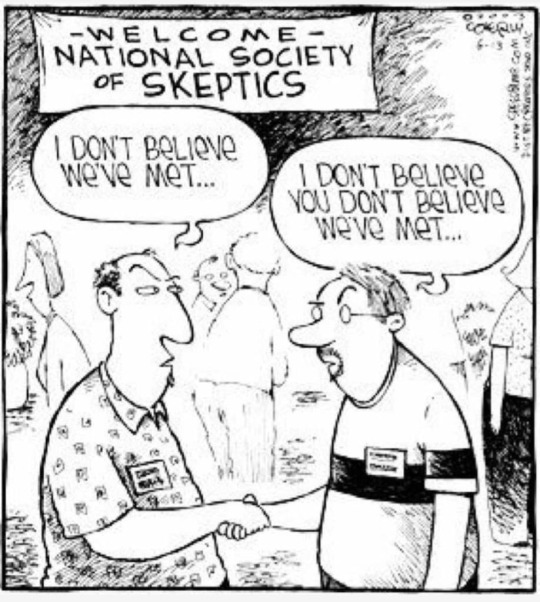
Picture a bustling marketplace filled with sellers, buyers, and our two comic skeptics. It's Elul, and the marketplace is abuzz with preparation for the High Holidays. One skeptic says, "I don't believe we can truly connect with the King," and the other replies, "I don't believe you don't believe we can’t connect. After all, the King is in the field!"
Now, imagine the King, not aloof in His palace but mingling among His subjects, shopping alongside them, sharing stories, and offering guidance. No grand entourage, no royal trumpets, just the King in humble attire, approachable and attentive.
The King in the field means that the Divine is accessible, as close as a neighbor, as familiar as an old friend. The marketplace of life becomes the place of connection, and teshuva becomes not a grand, intimidating gesture, but a simple, heartfelt conversation with the King.
It's like running into an old friend at the local store. You don't need to put on airs or speak in lofty terms. You just open your heart and share your thoughts, hopes, and regrets.
Teshuva in Elul is reconnecting with the King in the most personal way. It's acknowledging that we've strayed but also recognizing that the path back is as simple and natural as a stroll through the marketplace with a dear friend.
So, my blessing to you… May you take a walk through the fields and the marketplaces of your soul this Elul. The King is already there, waiting to listen, ready to guide, and eager to embrace your return. May your journey be as comforting as a warm bowl of matzo ball soup and as enlightening as a Sabbath candle's glow! The king is waiting, all you have to do is start speaking.
Rabbi Yisroel Bernath
62 notes
·
View notes
Text
Feeling woefully unprepared for Elul and the High Holy Days. This will be my first Elul since starting my conversion, my nerves are wrecked. Does anyone have recommendations for a good overview of this time in the calendar? I've seen a few BimBam videos and read a bit but still feel totally lost.
36 notes
·
View notes
Text
It's a big time in the Torah fandom.
24 notes
·
View notes
Text
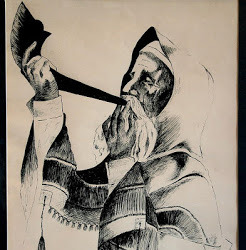
by Reb Gutman Locks
The month of Elul is the time to prepare for Rosh Hashanah (the New Year). On Rosh Hashanah we come before the Judge and our portions for the year are set. What we receive is determined mostly by our actions. There is a general principle, mida kenegid meda. It means, "portion across from portion", i.e. what we receive will be formed by what we do.
In Elul the King is in the field. This means that even the most simple of us can walk right over and talk to the King face to face. This is something we could never do if we had to gain entrance to His palace. The guards would never let us through the gate. What a wonderful opportunity we have.
The letters that spell Elul are the initial letters of King Solomon's heart felt description of a Jew's relationship with Hashem, "I am my beloved's, and my beloved is mine…,"[i] and this is what we want to take with us as we go through the year.
Although Hashem is always close to all who call, during the year we tend to forget this, but during the month of Elul we are reminded by the special early morning prayers, the blowing of the shofar, and the excitement that begins to fill the air.
May each of us receive a most favorable judgement… a year filled with joy and health with all of our prayers answered, and may we accomplish all of our positive goals. And, please G-d, may we become more aware of Your most glorious Presence.
Shanah Tovah U'metukah (A good and sweet year)
13 notes
·
View notes
Text

It’s almost hereee
114 notes
·
View notes
Quote
When evildoers approach me to devour my flesh, my foes and my enemies against me they will stumble and fall.
Tehila 27, Tehillim
64 notes
·
View notes
Text
Elul is meant to be a time of reflection, but for me it's a more complex time.
Specifically, I associate it with being the period of time many years ago after my rabbinical student ex bf had broken up with me, and which I spent waiting for him to apologize for being an ass, only blocking him after Yom Kippur, when I finally had to admit that wasn't going to happen.
Just in case he decided to do proper Elul reflecting himself. He did not.
7 notes
·
View notes